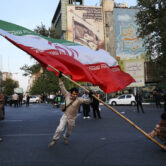(CN) — Russia's war aims against Ukraine are likely to become even more brutal and aggressive after the Kremlin linked Kyiv to the concert hall attack outside Moscow that killed at least 139 people and wounded many others.
By Monday, there were clear signs that Russia was stepping up its assault on Ukraine as it accused Kyiv of being behind the massacre on Friday night at the Crocus City Hall, a large music venue on the outskirts of Moscow.
In Kyiv, explosions rocked the city Monday after Russian missiles reportedly targeted a building housing top-ranking officials with Ukraine's Security Service. Missiles also struck Odesa.
With a branch of the Islamic State group claiming responsibility for the concert hall attack, Western governments accused Moscow of seeking to use the massacre to target Ukraine. Kyiv denied any involvement and accused Russia of staging the massacre to help unify and mobilize the country in its war against Ukraine.
On Monday, French President Emmanuel Macron warned Russian President Vladimir Putin against blaming Ukraine for the attack. At the same time, France raised its security alert to the highest level over concerns of IS attacks inside France.
“This attack was claimed by Islamic State and the information available to us, to our (intelligence) services as well as to our main partners, indicates indeed that it was an entity of the Islamic State which instigated this attack,” Macron said.
“It would be both cynical and counterproductive for Russia itself and the security of its citizens to use this context to try and turn it against Ukraine,” the French president added.
On Sunday evening, four suspects accused in the attack appeared in a Moscow court and were charged with terrorism. They showed signs of being severely beaten by Russian security officials. One of the men, brought in on a wheelchair, was barely conscious during the hearing. Russian media said the suspects had been tortured.
All four men were identified as citizens of Tajikistan. Seven other unidentified people were arrested in connection with the attack, authorities said.
During a five-minute address to the nation on Saturday, Putin linked the massacre to Kyiv by claiming the attackers were fleeing to Ukraine when they were stopped and arrested in a forest near Bryansk, a city about 60 miles from the Ukraine border.
“They attempted to escape and were heading towards Ukraine, where, according to preliminary information, a window was prepared for them on the Ukrainian side to cross the state border,” Putin said.
Russia's Federal Security Service and other law enforcement agencies would “expose the accomplice base behind these terrorists,” Putin vowed.
He charged that they were provided with transport, planned escape routes and caches with weapons and ammunition.
About 6,000 people were attending a concert by Picnic, a well-known and popular Russian rock band, when the four suspects arrived at the hall at about 8 p.m. and began shooting people indiscriminately with automatic rifles and pistols. They set the concert hall on fire with firebombs, causing scores of deaths.
It was the worst terrorist attack in two decades in Russia and left the nation in a state of shock and anger.
In Russia, the attack was framed as part of Ukraine's widening campaign to hit Russia inside its borders with drone strikes on energy infrastructure and oil refineries, missile attacks on Russian border towns and cities and troop incursions into border regions.
Putin vowed a harsh response to the concert hall attack.
“It is already clear that we are confronted not simply with a carefully and cynically planned terrorist attack, but a premeditated and organized mass murder of peaceful, defenseless people,” Putin said.









